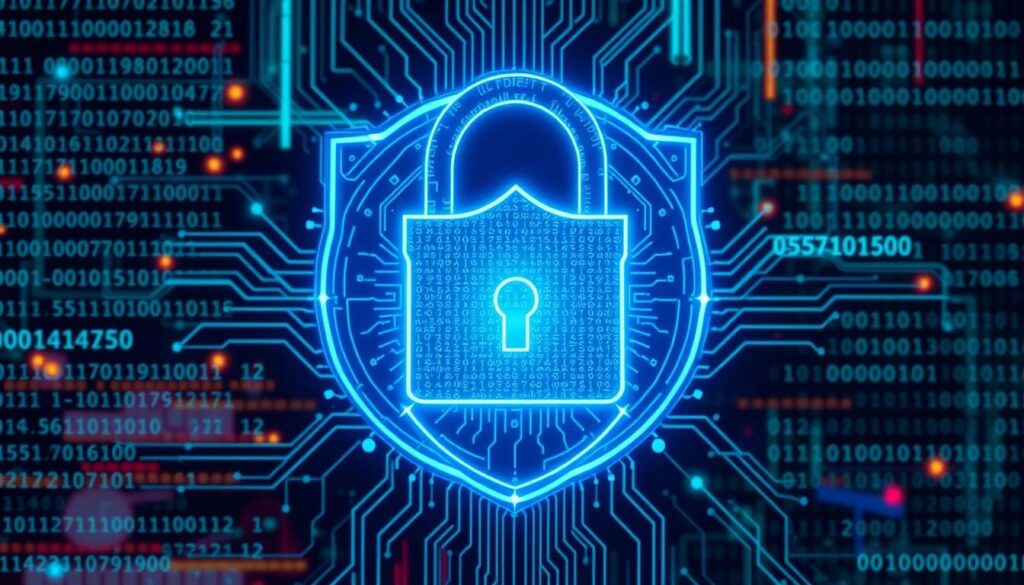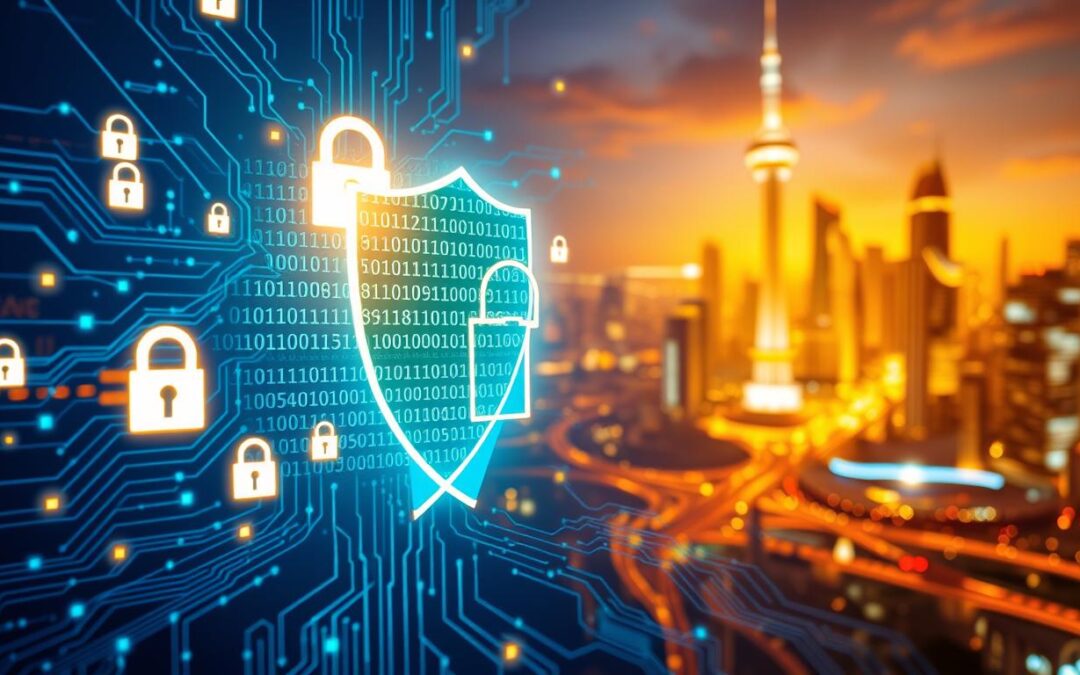In today’s world, keeping the internet safe is crucial. Millions join together on February 7th for Safer Internet Day. With cyber threats on the rise, it’s key to have good internet security plans to keep our data safe.
Good cybersecurity starts with what we do, not just new tech. With 79% of U.S. adults worried about data use, we must focus on cyber security. Knowing the latest threats and acting early can help a lot.
Cyber attacks like ransomware and phishing are getting more common. Understanding internet security is vital. By managing our cyber security, we can safeguard our data and avoid big financial losses. The average cost of a data breach in 2022 was $4.4 million worldwide and $9.44 million in the U.S.
Key Takeaways
- Prioritize internet security to protect personal data and prevent financial losses
- Stay informed about the latest online safety threats and take proactive measures to prevent them
- Effective cybersecurity relies more on user actions than on technology advancements
- Take control of your cyber security to prevent ransomware and phishing attacks
- Invest time and money in protecting your data, as 82% of consumers are willing to do so
- Consider the impact of cyber security on your online safety and take steps to stay safe online
Understanding Modern Internet Security Threats
The digital world is always changing, and so are the dangers to our online safety. Data protection is now a key concern for everyone. Corey Nachreiner, Chief Security Officer at WatchGuard Technologies, warns about spear phishing attacks. These attacks are getting smarter and can cause big problems, like money loss and data theft.
To keep safe online, knowing about cyber attacks is crucial. Secure browsing practices, like using strong passwords and updating software, can help. But, new network security threats are making old security methods less effective.
Common cyber attacks include phishing, ransomware, and malware. These can be very harmful, especially to small businesses. In fact, 43% of cyber attacks target small businesses, and 60% of them close within six months after an attack. To fight these threats, strong network security is needed, like firewalls and antivirus software.
By understanding and fighting digital threats, we can keep our online world safe. This means using data protection like encryption and teaching secure browsing habits. This helps prevent financial losses and keeps our data safe.
Essential Components of Personal Cyber Security
Personal cyber security is key in our digital world. Digital privacy keeps our personal info safe from prying eyes. Web security guards us against online dangers like malware and phishing.
A strong firewall protection system blocks unwanted access to our devices. Ram Varadarajan, Co-Founder & CEO of Acalvio Technologies, says threat hunting is rare. It’s a skill we need to make a standard part of security.
- 90% of successful cyber attacks start with a phishing email
- 87% of organizations have faced a cyber-attack attempt
- 76% of IT security pros think network segmentation boosts security
By knowing and using these key cyber security parts, we can lower cyber attack risks. This helps keep our digital lives safe.
Creating and Managing Strong Passwords
Internet security is all about keeping your online world safe. A big part of this is using strong passwords. It’s important to have different passwords for each website to avoid cyber attacks. Most data breaches happen because of weak or stolen passwords.
Knowing how to make strong passwords is key to online safety. Use a mix of letters, numbers, and symbols in your passwords. Avoid simple words like “password” or “1234”. These tips can help keep you safe from cyber threats.
Password Best Practices
Strong passwords should be at least 12 characters long. Even better, aim for 16 characters for extra security. Using a password manager can help you remember complex passwords without using weak ones. By following these tips, you can boost your internet security and stay safe from cyber attacks.

Multi-Factor Authentication Explained
Multi-Factor Authentication (MFA) can stop up to 99.9% of automated cyber attacks. It’s a vital part of keeping your online world safe. Adding MFA to your strong passwords can greatly enhance your cyber security and protect you from threats.
Secure Browsing: Protecting Your Online Activity
Secure browsing is key to keeping your online activity safe from cyber threats. It’s important to use a password-protected Wi-Fi network to protect against attacks. Digital privacy is a big concern, and safe browsing can help lower risks. Recent stats show that 90% of data breaches come from phishing, showing the need for safe browsing.
To keep your network secure, use safe browsing methods. This includes using a Virtual Private Network (VPN) on public Wi-Fi. This can cut down data interception risk by up to 90%. Also, password managers can cut down password reuse by over 70%, boosting online safety.
- Using strong, unique passwords for each account
- Enabling two-factor authentication (2FA) whenever possible
- Keeping web browsers and security software up to date
- Avoiding suspicious links and downloads
By following these tips and using safe browsing, you can greatly lower your risk of cyber attacks. This helps protect yourdigital privacy.
Understanding and Implementing Network Security
Network security is vital for keeping your digital information safe. It stops unauthorized access to sensitive data. Router security settings play a big role in this, helping to block cyber attacks. Using a Virtual Private Network (VPN) is also crucial, especially on public Wi-Fi. It encrypts your internet traffic, keeping hackers from getting your data.
Recent data shows VPNs greatly lower the risk of cyber attacks on public Wi-Fi. In fact, a data breach can cost an average of $4.24 million to a company. To keep your network secure, consider these steps:
- Configuring router security settings to prevent unauthorized access
- Implementing a VPN to encrypt internet traffic
- Using web security tools to detect and prevent cyber threats
By focusing on network security, you can protect your digital privacy and avoid expensive cyber attacks. As web security becomes more important, it’s key to stay updated on threats. This way, you can keep your online presence safe.
Data Encryption: Your Digital Safety Net
Data encryption is key to staying safe online. It offers a strong data protection against ransomware and other cyber threats. Arti Raman, CEO of Titaniam, says it’s vital for fighting ransomware. With more people working remotely, secure browsing and network security are more crucial than ever.
Some important stats show why data encryption matters:
- More than half of those with data encryption issues blame unencrypted cloud services.
- AES 256-bit encryption is almost unbreakable, offering top-notch protection for sensitive data.
- Devices used for internet access, like mobiles, are also at risk and vulnerable to breaches.
To protect data, you can use Virtual Private Networks (VPNs) and secure messaging. By focusing on data protection and network security, you can lower cyber attack risks. This ensures secure browsing for everyone.

Social Engineering and Phishing Prevention
When we’re online, we face many dangers. Social engineering and phishing are big threats. They can cause a lot of harm if we’re not careful. Mike Kiser, Director, Strategy and Standards at SailPoint, says being aware and educated can stop these threats.
Stopping phishing is key to staying safe online. It needs both technical steps and knowing how to spot scams. To fight phishing, we should recognize scam attempts, use email security, and add extra login steps. These actions help keep our online world safe.
- Advanced spam filters to catch and block fake emails
- Multi-factor authentication to stop unauthorized access
- Training on how scammers work for employees
- Keeping software up to date to avoid risks
By focusing on online safety and stopping these attacks, we can avoid big problems. As we use the internet more, keeping it safe is crucial. We must take steps to protect ourselves from these dangers.
Mobile Device Security Essentials
Mobile devices are becoming more common, making mobile security key. With more cyber attacks, keeping your digital life safe is vital. Devices face threats like viruses, malware, and phishing scams.
To keep your device safe, manage app permissions and use antivirus. App permission management lets you control what apps can do. This stops unwanted access to your info and lowers cyber attack risks.
Mobile Antivirus Solutions
Mobile antivirus adds extra protection against threats. It finds and blocks malware, viruses, and more. Popular options include McAfee and Microsoft Security Essentials.
- Real-time protection against malware and viruses
- App permission management
- Phishing alerts and protection
- Firewall protection
By following these steps, you can safeguard your mobile device. This ensures your digital privacy and web security.
Advanced Internet Security Tools and Software
Protecting against cyber threats is crucial for online safety. Over 1 billion users worldwide trust ESET digital security technology. This shows the need for reliable cyber security solutions. Advanced tools and software are key to staying ahead of threats.
Advanced internet security tools can detect and remove malware, spyware, and ransomware. Top solutions like ESET and McAfee offer real-time scanning and behavioral analysis. They also have firewalls, patching, and dark web scanning to prevent unauthorized access and identity theft.
- ESET HOME Security Essential, which includes features from ESET Internet Security
- McAfee LiveSafe, which offers protection for an unlimited number of personal devices per subscription
- VPN services, such as those included with the Ultimate Security Bundle, which provide bank-grade AES 256-bit encryption
Investing in advancedinternet security tools and software boosts online safety. It helps protect against cyber threats. With digital threats always changing, staying informed and proactive is vital for strongcyber security.
Maintaining Security Through Regular Updates
Regular updates are key for keeping the internet safe. Cyber threats are getting smarter, and old software can be a weak spot. Keeping software and systems current is vital to fight off cyber attacks.
Updates help lower the risk of cyber threats. They fix known issues and make it harder for hackers to find weak spots. Each update brings new security features to keep you safe.
Operating System Updates
Updates for your operating system are very important. They often include fixes for security issues. These updates help stop cyber attacks and keep your data safe.
Updates for security software are also crucial. They help find and block malware and other threats.
Device Firmware Updates
Updates for device firmware are also essential. They fix problems in devices like routers and IoT gadgets. Keeping firmware current helps prevent cyber attacks and keeps your network and data safe.
In conclusion, regular updates are a must for internet security. By keeping up with the latest security patches, you can protect yourself from cyber threats. This helps keep your online world safe and secure.
Conclusion: Building a Robust Security Strategy
Building a strong internet security plan is key to staying safe online. We’ve looked at many parts of personal cyber security. This includes making strong passwords, securing devices, and understanding network security.
It’s important to remember that online safety needs a full and active plan. By following best practices and staying alert, we can keep our digital world safe. This helps us protect ourselves and our online stuff from new cyber threats.
Security is a team effort. Technology is important, but so are educated employees and good company policies. Together, we can make a safer digital world. This protects our personal and work lives online.

